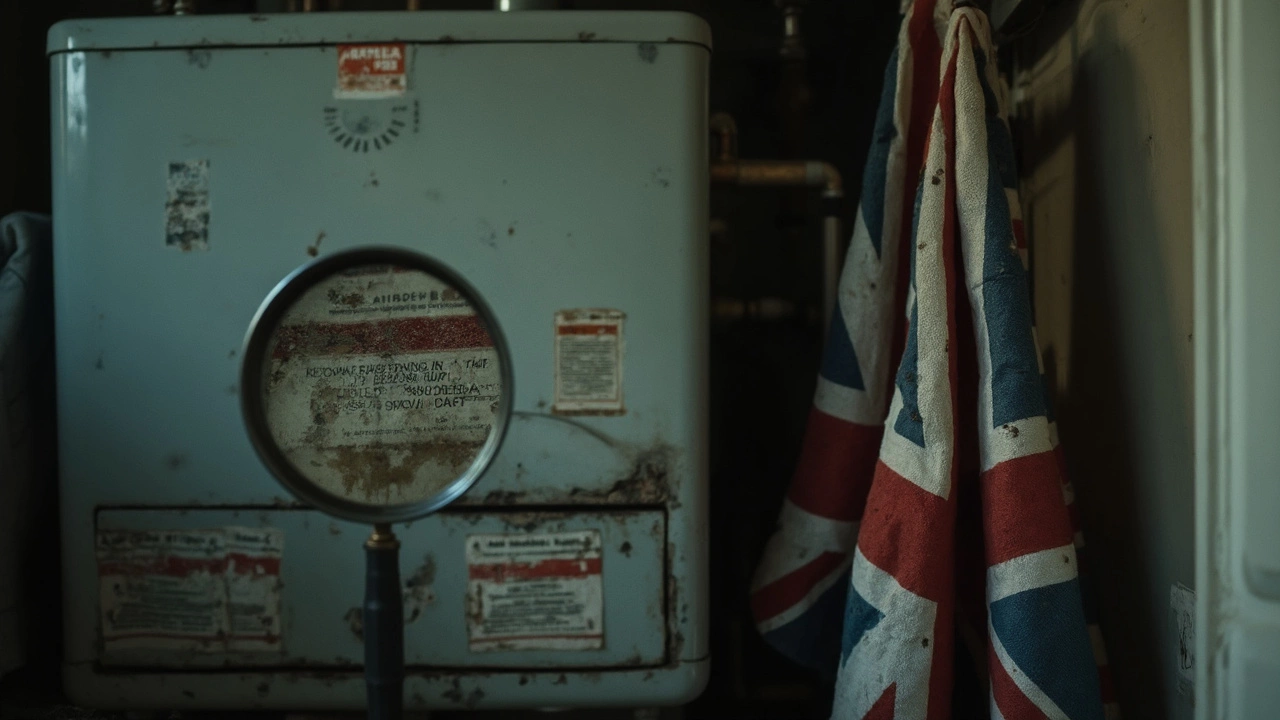A lot of people have boilers in their homes that have been around longer than some of their appliances—or even their pets. So, is a 40-year-old boiler actually safe to keep using? Here’s the thing: safety isn’t just about whether the boiler still heats your water or radiators. Age brings a stack of hidden risks that you can’t just brush off with a quick once-over.
Parts inside a boiler don’t last forever. Even if your old unit fires up fine every morning, years of heat, rust, and pressure take a toll. Seals harden, metal parts get thin, and safety controls might not be as sharp as they used to be. An old boiler might run, but it could also be way more likely to leak dangerous gases or suddenly break down. A surprising fact: most modern boilers are made to last 10–15 years at best—so hitting the big 4-0 is a serious overachievement, but not always in a good way.
- Why Age Matters for Boilers
- Hidden Dangers of Old Boilers
- Warning Signs You Can’t Ignore
- Repair or Replace — How to Decide
- Keeping Safe with Routine Checks
Why Age Matters for Boilers
Once a boiler hits 40 years, it’s working with parts and technology that are completely out of date. Think about it—40 years ago, most people were still renting VHS tapes and rotary phones weren’t just antiques. The 40 year old boiler in your basement was built to standards that seem ancient today, especially when it comes to safety and efficiency.
Materials break down over time. Rubber seals dry out, metal tanks collect rust, and old wiring can get brittle or exposed. These changes mean old boilers are less reliable, way less efficient, and much more likely to surprise you with a breakdown or leak. Safety features we take for granted now, like advanced pressure release valves or carbon monoxide sensors, weren’t always part of the design back then.
| Boiler Age | Expected Efficiency | Breakdown Risk |
|---|---|---|
| 0-10 years | 85-95% | Low |
| 11-20 years | 75-85% | Moderate |
| 21-40 years | 60-75% | High |
| 40+ years | Below 60% | Very High |
Here’s what matters even more: energy use. A 40-year-old unit can use up to 40% more fuel than a new one to do the same work. That’s a drain on your wallet and not great for the planet either.
- Replacement parts for old boilers are almost impossible to find. If something big fails, it’s game over.
- Many insurance companies won’t cover damages from leaky or broken boilers once they get very old.
- Your risk of dangerous leaks—especially carbon monoxide—jumps as the boiler ages and internal sensors get less accurate.
If your boiler is 40 or even close, you’re running on borrowed time. It’s kind of like relying on a classic car for your daily commute—cool, until it leaves you stranded when you least expect it.
Hidden Dangers of Old Boilers
Old boilers can look harmless, but there’s a lot going on inside that can go wrong without any warning. Corrosion eats away at metal parts, and that’s not just about leaks. When the inside metal gets thin, even small cracks can let carbon monoxide escape—and you won’t spot that until you feel dizzy or worse. The Gas Safe Register warns,
“Carbon monoxide is a deadly gas that you can’t see, smell, or taste. Faulty or old boilers are a common cause of leaks in UK homes.”
Let’s talk numbers. According to government safety stats, domestic boilers cause hundreds of dangerous incidents every year across the UK, with aging systems listed as a key reason. It’s not just about leaks—old boilers lose their ability to shut down safely in the event of failure. Their safety shutoff systems may be outdated or simply worn out, which can let a small fault spiral into something serious fast.
Other big risks with a 40-year-old boiler include:
- Boiler safety controls may not work properly, so the unit might keep heating up even if something’s wrong.
- Pressure build-up that the tank can’t handle any more, leading to the real risk of a burst or even an explosion (rare, but it happens).
- Rusty or blocked flue pipes, not venting gases the way they should.
- Water leaks that turn into mould, or damage floors and ceilings before you notice.
To put this into perspective, here’s a quick look at incident data:
| Risk Area | Number of UK Incidents (2024) |
|---|---|
| Gas Leaks | 280 |
| Carbon Monoxide Incidents | 175 |
| Pressure-related Failures | 67 |
| Water Damage from Leaks | 420 |
Most of these could’ve been avoided with a newer boiler or more regular checks. So if you’re still relying on a 40-year-old boiler, know the hidden risks are real—and don’t always show up with obvious warning signs.

Warning Signs You Can’t Ignore
Old boilers don’t always just quit. Instead, they give you clues—sometimes pretty obvious ones, sometimes super subtle. Catching problems early can stop a minor headache from becoming a huge, expensive mess. Here are the signs you shouldn’t shrug off:
- Strange noises: Bangs, clunks, or whistling sounds aren’t normal. These could mean there’s air in the system, scale buildup, or failing parts shaking loose inside your 40 year old boiler.
- Pilot light keeps going out: If your pilot light doesn’t stay lit, it could be a sign of a failing thermocouple, tired out gas valves, or a problem with air supply. Repeated outages definitely need attention.
- Leaks or puddles: Water around your boiler might mean a broken seal or rusted pipe. Don’t ignore even small drips—they can easily get worse.
- Low pressure: Old boilers sometimes struggle to maintain the right pressure, which can cause heat loss or even force a shutdown. If you have to keep topping up the pressure, something’s not right.
- Weird smells: A faint metallic or burning smell isn’t just something to live with. It can point to overheating wires or even gas leaks (which are dangerous—turn off the boiler and call a pro right away).
Your energy bills can also tell the story. If costs are climbing even though your use hasn’t changed, your ancient boiler’s probably guzzling more fuel than it should. Big swings in temperature or hot water cutting out during your morning shower are also big red flags.
Here’s a quick reference table for common warning signs and what they might mean:
| Warning Sign | Possible Cause | What To Do |
|---|---|---|
| Banging noises | Scale buildup, loose parts | Have a pro flush or repair the system |
| Pilot won’t stay lit | Faulty thermocouple, gas valve issues | Stop using and call for service |
| Water leaks | Leaking seals, rusted pipes | Fix ASAP to prevent bigger issues |
| Low boiler pressure | Leaks, pressure relief valve problems | Investigate right away |
| Odd smells | Overheating components, gas leak | Turn off the system and call a professional |
Bottom line: don’t ignore these symptoms with a 40 year old boiler. Hoping for the best isn’t a repair plan. If you notice even one of these red flags, it’s time to get the system checked before something much worse comes knocking.
Repair or Replace — How to Decide
So you’ve got this antique clunker keeping your showers warm—should you fix it up again, or bite the bullet and get something new? Deciding whether to repair or replace a 40 year old boiler isn’t just about how much cash you want to spend. It’s mostly about safety, reliability, and future headaches (or avoiding them).
Here's the deal: most boilers start causing real trouble after 15 years. By 40, replacement parts are not only hard to find, they're often much more expensive. You might be putting money into a system that just can't keep up anymore. Efficiency drops with age, so you’re likely paying more on your bills too. According to the Energy Saving Trust, “Boilers over 15 years old can be as little as 60% efficient, compared to over 92% for modern ones.” That’s a serious difference in how much energy (and money) goes up in smoke each month.
"If a boiler is over 25 years old, we strongly recommend replacing it rather than repairing — the safety, efficiency, and comfort benefits far outweigh another patch-up." – Gas Safe Register
Here are a few things to ask yourself if you’re on the fence:
- Is it leaking, banging, or giving off odd smells? Don’t play around—these are big red flags.
- Are replacement parts even available? If your tech shrugs or gives you a price that makes you gulp, it’s a sign.
- How much did your last few repairs cost? Add up your bills for the last two years. If you’re spending hundreds each year, it’s not worth it.
- Has your boiler left you shivering in the cold… more than once? That’s reliability (or the lack of it) telling you something.
Here’s a quick breakdown to help make the call:
| Factor | Repair | Replace |
|---|---|---|
| Boiler Age | < 15 years | > 15 years (especially 40!) |
| Cost of Repair | < £200 | > £300 or frequent |
| Efficiency | > 80% | < 70% |
| Parts Available? | Yes | No/difficult |
| Safety Concerns | No | Yes |
If your boiler ticks any of the "replace" boxes above, you’re probably much better off putting your money into a more efficient, reliable, and safer system. Think long-term: a new boiler doesn’t just heat water—it can actually cut your bill each month and take a load off your mind.

Keeping Safe with Routine Checks
If you’re still rocking a 40 year old boiler, safety checks are your best friend. Regular maintenance isn’t a maybe—it’s a must. An annual service by a Gas Safe registered engineer is the bare minimum. That’s not just a box-ticking exercise; it literally helps catch leaks, faulty wiring, and failing safety valves that old boilers like to hide.
Here’s what a thorough check should include:
- Carbon monoxide testing—this gas is deadly and has no smell, so never skip this part.
- Inspection of pressure levels—not enough pressure, no heat; too much, and you risk leaks or even bursts.
- Checking the burner and heat exchanger for cracks or corrosion, which are common failure points at this age.
- Making sure the safety shut-off works—if this is broken, your home’s at bigger risk in case of a fault.
- Inspecting flues and vents for blockages or rust.
Don’t just take your engineer’s word for it; ask for a written safety report. And always keep carbon monoxide alarms in a few spots around the boiler and bedrooms.
To get a feel for the stakes, check out the numbers below:
| Check Type | Issues Found (in boilers over 30 years old) |
|---|---|
| Carbon Monoxide Leak | 1 in 10 |
| Faulty Shut-off Valve | 1 in 8 |
| Corroded Heat Exchanger | 1 in 5 |
Those odds are nothing to ignore. If any of these problems pop up, don’t delay repairs. If fixes start to pile up, it’s time to weigh up repair costs against the price of a modern, safer model. Old doesn’t mean useless—but it means you need to keep your eye on things, every single year.


